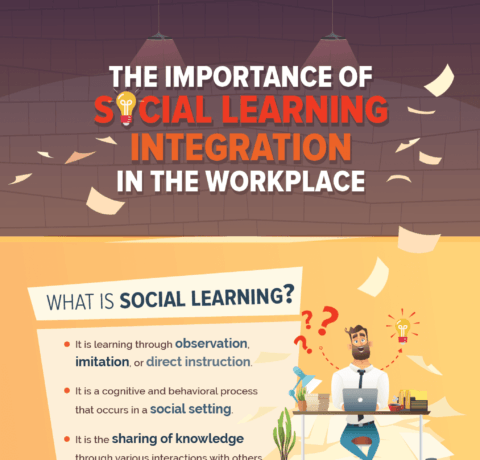The Importance of Social Learning for Companies Infographic
The Importance of Social Learning for Companies Infographic presents the benefits and value of social learning in the corporate environment. Social learning is the process of learning through social interaction between peers. Social learning can take place in informal one-on-one encounters, among teams in the course of real-time problem-solving, communities of practice, through social software, expertise directories, and more. The key is that the company fosters a culture of continual learning, in which employees are empowered and encouraged to share what they know with each other and to seek out colleagues’ expertise to increase performance across the organization.
In order to retain more new material, it’s extremely helpful to enable the learner to actively engage in the process. Human beings learn best by asking questions, discussing issues, sharing ideas, and teaching what we know. When we are engaged — repeating information and ideas while interacting with others to explore an area of learning — it stimulates deeper critical thinking. No matter what a person’s dominant learning style is — auditory, visual, or tactile — active participation is the most effective way to solidify new knowledge for the vast majority of people. This is the potential power of social learning done well.
Quick Stats
- 70–90% of all workplace learning happens informally.
- 87% of employees identify social knowledge sharing as essential. Only 37% feel the same way about formal company training.
- Less than 30% of millennials feel they have the opportunity to contribute to the best of their ability at work.
- Over 50% of companies are using social learning practices today. 2/3 plan to implement or increase social learning initiatives in the future.
- Companies spent 39% more on knowledge sharing tools in 2013 than the year before.
To dig deeper, check out the white paper, “Social Learning and The Future of Work.” It discusses the value of social learning in corporate education efforts and the challenges and benefits to implementing social learning technology. In particular, this white paper covers:
- Why Traditional Workplace Learning Falls Short
- How Social Learning Fills the Gap
- The Benefits of Social Learning Technology
- Generational Differences in Learning Preferences
- The Challenge of Implementing Social Learning
- The Future of Work







You can adjust your cookie preferences here.